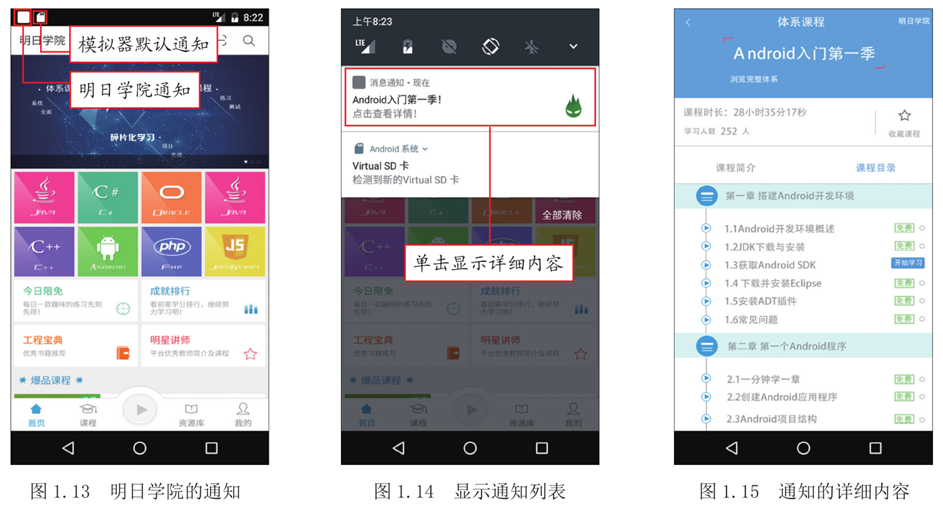getSystemService是Android很重要的一个API,它是Activity的一个方法,根据传入的NAME来取得对应的Object,然后转换成相应的服务对象。以下介绍系统相应的服务。
|
传入的Name |
返回的对象 |
说明 |
|
WINDOW_SERVICE |
WindowManager |
管理打开的窗口程序 |
|
LAYOUT_INFLATER_SERVICE |
LayoutInflater |
取得xml里定义view |
|
ACTIVITY_SERVICE |
ActivityManager |
管理应用程序的系统状态 |
|
POWER_SERVICE |
PowerManger |
电源服务 |
|
ALARM_SERVICE |
AlarmManager |
闹钟服务 |
|
NOTIFICATION_SERVICE |
NotificationManager |
状态栏服务 |
|
KEYGUARD_SERVICE |
KeyguardManager |
键盘锁服务 |
|
LOCATION_SERVICE |
LocationManager |
位置的服务,如GPS |
|
SEARCH_SERVICE |
SearchManager |
搜索服务 |
|
VEBRATOR_SERVICE |
Vebrator |
手机震动服务 |
|
CONNECTIVITY_SERVICE |
Connectivity |
网络连接服务 |
|
WIFI_SERVICE |
WifiManager |
Wi-Fi服务 |
|
TELEPHONY_SERVICE |
TeleponyManager |
电话服务 |
示例1:图书《Android精彩编程200例》,实例006状态栏的服务例子:

获取通知管理器并创建通知对象。代码如下:
01 //获取通知管理器,用于发送通知
02 Notif icationManager notif icationManager =
03 (Notif icationManager) getSystemService(NOTIFICATION_SERVICE);
04 Notif icationCompat.Builder notif ication = new
05 Notif icationCompat.Builder(MainActivity.this); //创建一个Notif ication对象
设置通知的相关参数与通知的发送时间。代码如下:
01 notification.setAutoCancel(true);
02 //设置显示在状态栏的通知提示信息
03 notification.setTicker("Android课程第一季上线啦!");
04 //设置通知的小图标
05 notification.setSmallIcon(R.mipmap.ic_launcher);
06 //设置下拉列表中的大图标
07notification.setLargeIcon(BitmapFactory.decodeResource(getResources(),R.mipmap.ic_launcher));
08 //设置通知内容的标题
09 notification.setContentTitle("Android入门第一季!");
10 //设置通知内容
11 notification.setContentText("点击查看详情!");
12 //设置发送时间
13 notification.setWhen(System.currentTimeMillis());
设置从通知栏跳转至通知的详细内容界面,并进行通知的发送。代码如下:
01 //创建一个启动其他Activity的Intent
02 Intent intent = new Intent(MainActivity.this,
03 MessageActivity.class);
04 PendingIntent pi = PendingIntent.getActivity(
05 MainActivity.this, 0, intent, 0);
06 //设置通知栏单击跳转
07 notification.setContentIntent(pi);
08 //发送通知
09 notificationManager.notify(NOTIFYID, notification.build());
示例2:常用功能,获取屏幕高度宽度,代码如下:
01 //获取屏幕管理器
02 WindowManagermWindowManager = (WindowManager) getSystemService(Context.WINDOW_SERVICE);
03 //获取宽度
04 width = mWindowManager.getDefaultDisplay().getWidth();
05 //获取高度
06 height = mWindowManager.getDefaultDisplay().getHeight();
本文摘自明日科技出版的《Android 精彩编程200例》,转载请注明出处!!!